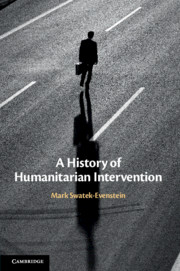Book contents
- A History of Humanitarian Intervention
- A History of Humanitarian Intervention
- Copyright page
- Epigraph
- Contents
- Acknowledgements
- Introduction
- 1 The Battlegrounds of a History of ‘Humanitarian Intervention’
- 2 A History of ‘Humanitarian Intervention’ in Nineteenth-Century International Law
- 3 ‘Humanitarian Intervention’ in the Era of the League of Nations
- 4 The World after 1945
- Bibliography
- Index
- A History of Humanitarian Intervention
- A History of Humanitarian Intervention
- Copyright page
- Epigraph
- Contents
- Acknowledgements
- Introduction
- 1 The Battlegrounds of a History of ‘Humanitarian Intervention’
- 2 A History of ‘Humanitarian Intervention’ in Nineteenth-Century International Law
- 3 ‘Humanitarian Intervention’ in the Era of the League of Nations
- 4 The World after 1945
- Bibliography
- Index
Summary
In 2014, when the Syrian Civil War was in its third year, an early episode of the successful American television series Madam Secretary revolved around events in the fictitious ‘Republic of West Africa’, where 50,000 innocent civilians faced a campaign of ethnic cleansing by their government. Convinced that it was America’s duty to help, the show’s main character, a woman named Elizabeth McCord (played by Téa Leoni) as the Secretary of State, in her first few weeks in office, faces an administration convinced that saving the lives of thousands of people in Africa is nothing that would be in the national interest of the United States of America. Over the course of this episode of Madam Secretary, the protagonists discuss the political and moral implications of a military intervention to stop a possible genocide taking place on their watch. But for a popular show engaging with national and international events, it is remarkably silent about the law on such international operations. While the situation is eventually resolved through a military operation by the African Union, an organisation arguably capable of engaging in legal military ‘humanitarian interventions’,1 this seems like a major gap in the storyline – the question of the legality of such operations under international law, particularly in light of the ongoing conflict in Syria and its rising death toll.
- Type
- Chapter
- Information
- A History of Humanitarian Intervention , pp. 1 - 7Publisher: Cambridge University PressPrint publication year: 2020

